Voices of the Grain Trade

Joe Ripku
Grain Labourer: Manitoba Pool Elevators
Joe Ripku worked for one eventful summer at Pool 9 as a 15 year old. Like most summer students, Joe started out shovelling boxcars in the car shed, but an injury to his foot led him to lighter work on the dock. On August 7, 1945, Joe witnessed the explosion of the next-door Pool 4B (Pool 5 at the time) from his post on the dock. Joe describes the scenes of the explosion and its aftermath, the rescue of workers, and the impact the explosion had on his Current River community.
Snippet
Full Interview
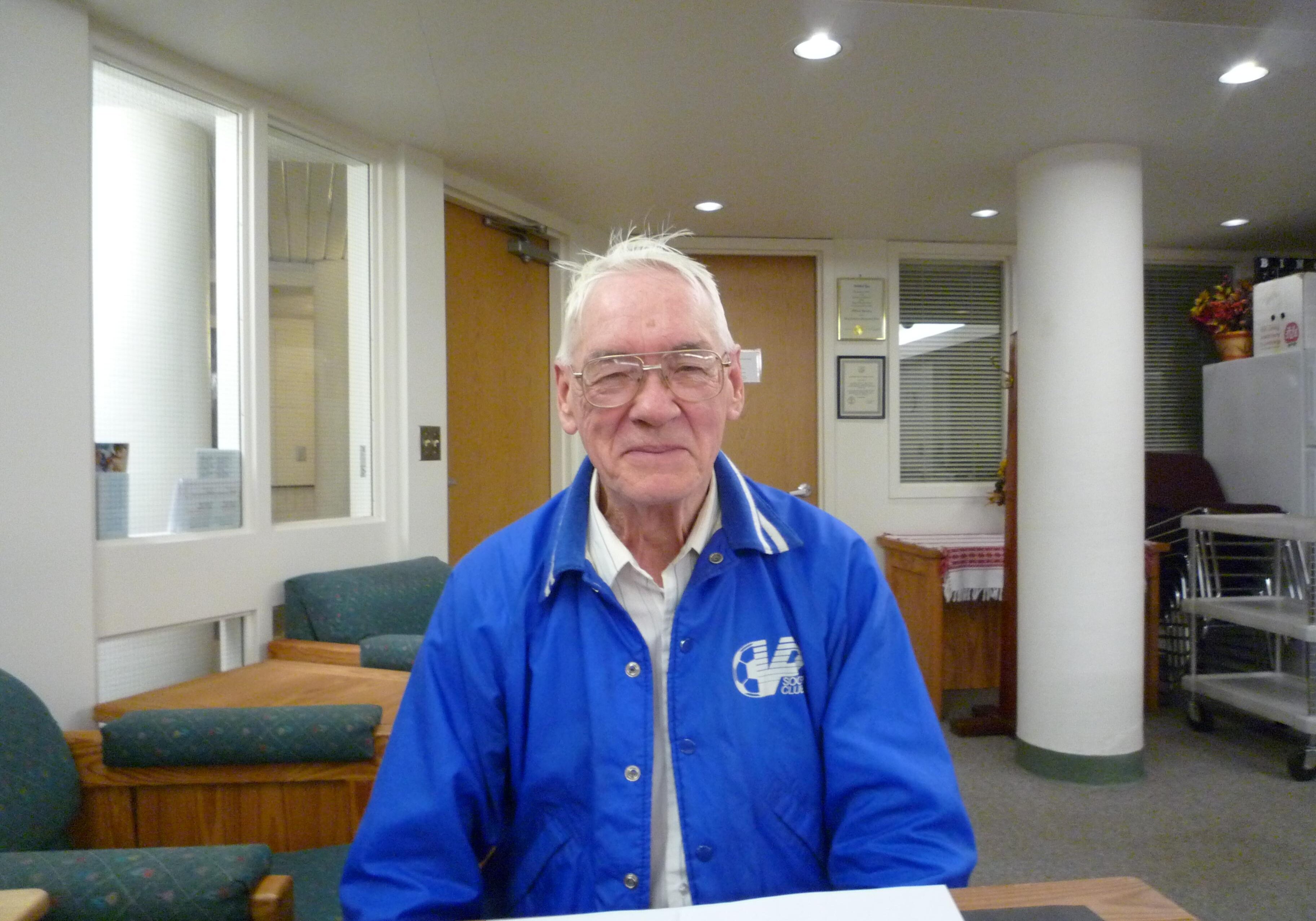
Len Rissanen
Story Teller
Although Len is not an elevator worker, he wanted to record the story of his father's bravery in rescuing workers stranded at the top of Saskatchewan Pool 4 after the disastrous 1945 explosion that killed over 20 workers. This short celebrates his father's brave work that earned him the St. John’s Ambulence Gold Lifesaving Award.
Snippet
Full Interview

Leonard Robidaux
Grain Farmer
Leonard Robidaux grew up on a family farm in a Francophone Manitoba community through the trials of the Great Depression. As a boy, Leonard's duties on the farm changed with the seasons, and despite joining a Catholic juniorate for his schooling, he chose to continue on the farm, eventually taking over from his parents. Leonard recalls the rapid advancements to farm equipment and inputs, as well as his deep connection to farm associations and agriculture clubs in the community. Leonard also tells the story of how one year he was seriously injured by a tractor and unable to work in the fields, but his family and neighbouring farmers came together to keep the farm going.
Snippet
Full Interview
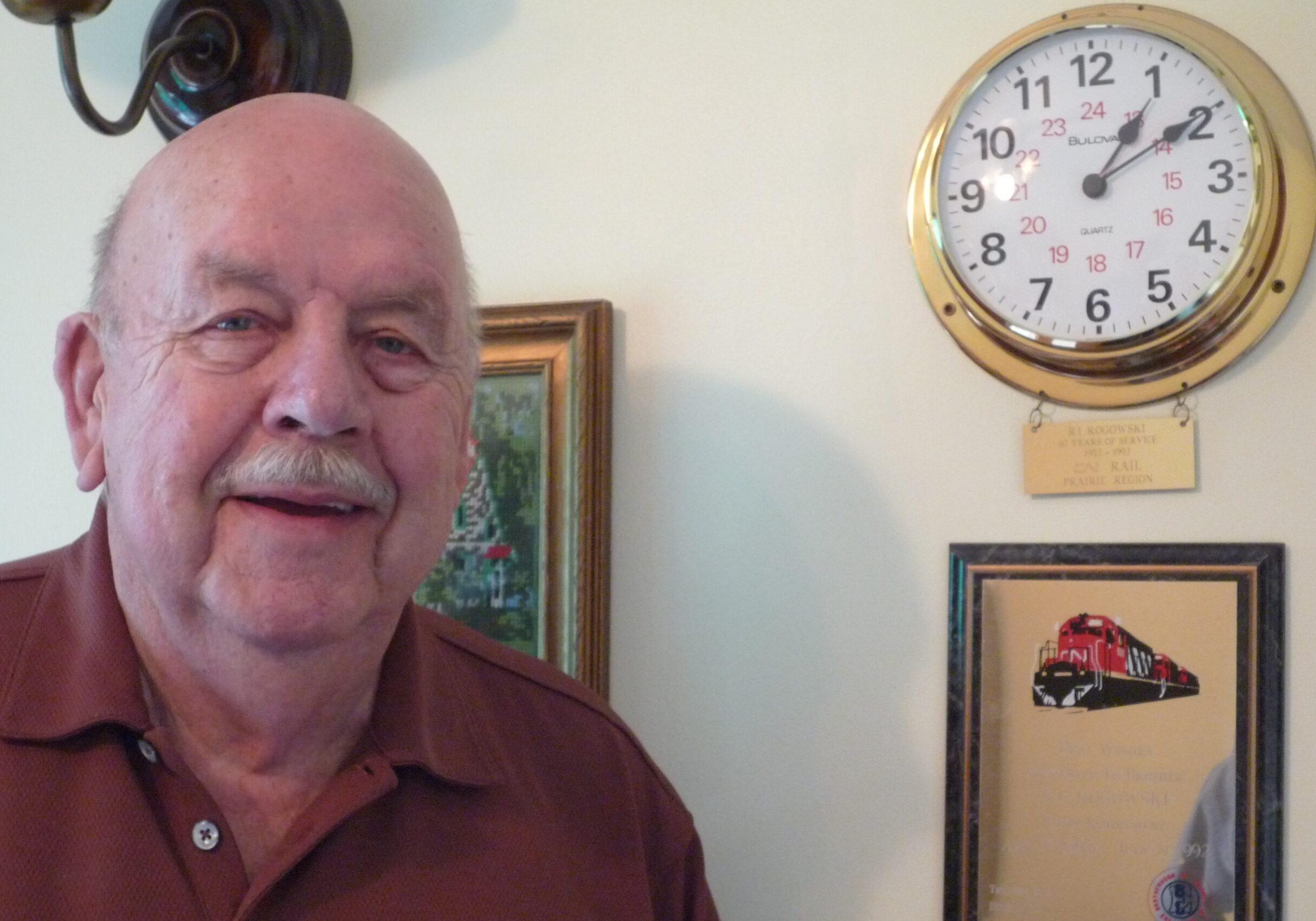
Ray Rogowski
Engineer: Canadian National Railway
Ray Rogowski's family homesteaded in Manitoba, and he grew up on the farm before starting his career on the railway. Ray's first posting was as a fireman on steam-powered engines that picked up grain cars from country elevator points that were eventually shipped to Thunder Bay. Depending on how good the crop year was, Ray's schedule could be hectic or slow, so he took jobs as a fireman in railway terminal points across the country to fill the down times. Ray eventually qualified to be an engineer and took a permanent posting in Thunder Bay. He discusses the major changes to the railway operation during his career, like the switch from steam to diesel locomotives, automation, improvements to safety, and downsizing of train crews from five to two men. Ray saw both Thunder Bay's heyday as a grain port and its decline, and he recognizes the railway's integral part within the grain industry.
Snippet
Full Interview

Ricard Ross
Welder: Manitoba Malting
Richard Ross worked in various elevators in his time, such as Manitoba Malting and one of the Saskatchewan Wheat Pools. He starts off by explaining his familial history and explains the trouble his mother had operating a Ford Model T car. He explains his role in installing dust filters. Another skill that he learned over time was welding. He explains a funny story about how he got chosen to work for a company by a donkey: his taste for carrots eventually landed him a job. Richard also speaks about ship building in Port Arthur.
Snippet
Full Interview
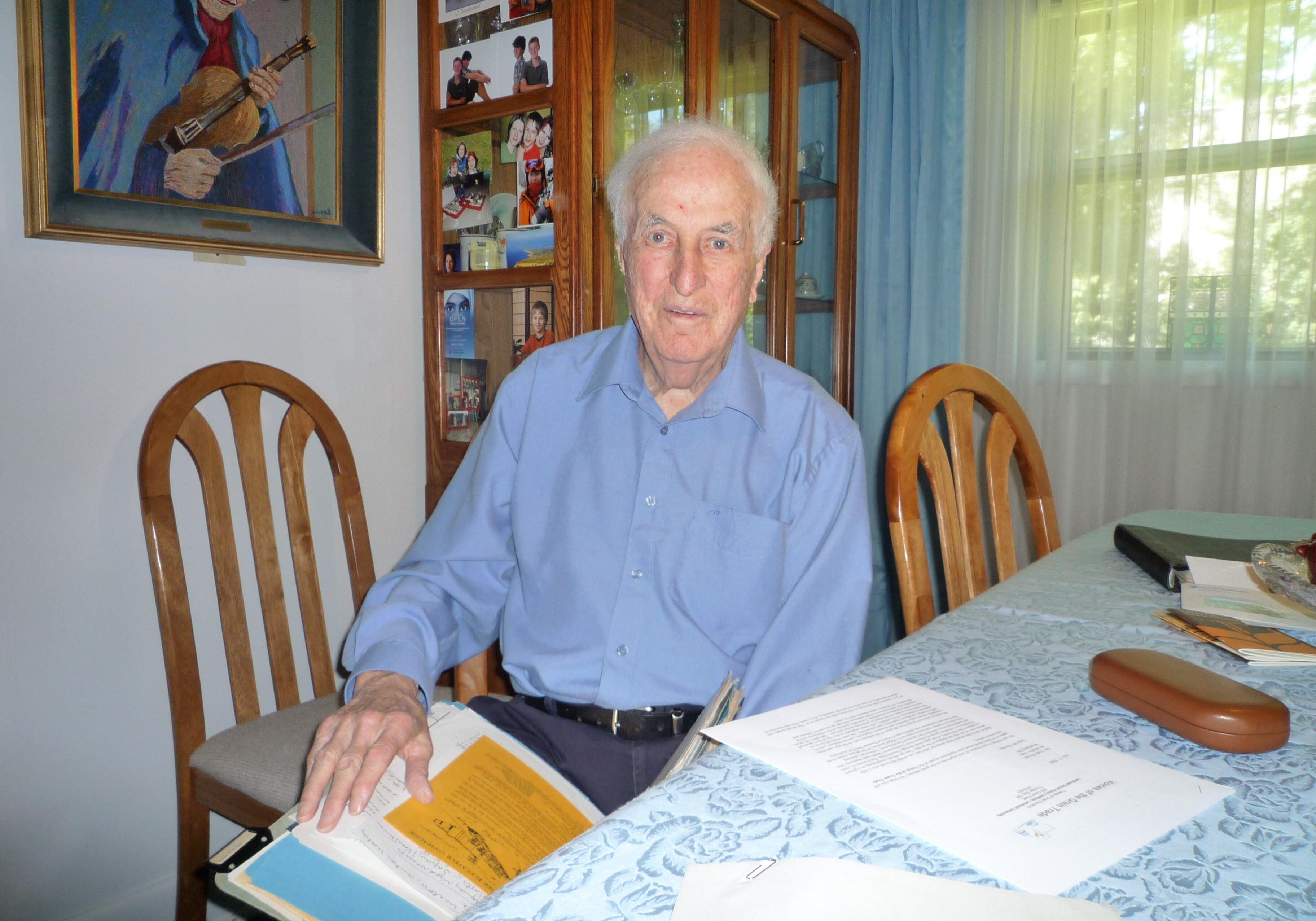
Frank Rowan
Naval Controller: Canadian Maritime Commission, Canadian Wheat Board
Frank Rowan worked as a Naval Controller. He speaks about his father, who was in charge of various naval disaster investigations, such as the Halifax Explosion. Frank was a pilot during WWII, but he also talks about the creation of the wartime storage warehouses and why they were needed. After returning from the war, Frank enrolled in the University of Ottawa and joined the Canadian Maritime Commission. His career began here, where he would keep track of hundreds of shipping vessels. He worked in this industry for a long time, after a while getting hired at the Canadian Wheat Board, where he still kept track of ships but also helped to set up new offices in various Canadian cities. Mr. Rowan's experience in the industry is vast, and because of his relatively high up position and time spent in various cities, he has a broad yet complex understanding of the industry.
Snippet
Full Interview

Patrick Rowan
Grain Trader: BARI Canada, Cargill, Stow Grain, United Grain Growers, Conagra Grain
Patrick Rowan had a deep connection to Canada's grain trade since he was a child through his father's career. Although he wasn't pushed towards the same industry, Patrick found himself involved with grain for his whole career. Gaining his first experiences as a summer labourer in Thunder Bay's terminals, Patrick became a grain trader for Cargill's eastern domestic division. The most important responsibility for a trader was to gather and interpret daily masses of global information to inform the best trades. Patrick took his domestic trading experience to both small and large Canadian companies, eventually specializing in barley export trades. He helped open the market for Canadian barley in Colombia, and he became interested in the research end of the barley industry. Patrick has a wide range of experience in both private and cooperative companies, which gives him a unique perspective on the changes to grain trading over his career.
Snippet
Full Interview

Patricia Roy
Grain Sanitation Officer: Canadian Grain Commission
Patricia Roy worked as a Grain Sanitation Officer with the Canadian Grain Commission, starting in 1988. Her job entailed running the entomology lab - essentially testing various elevators to see if there were insects in the grain. She describes the various requirements and challenges she faced. For instance, it was a heavily physical job. Patricia also mentions what being a woman was like in a male dominated industry. She did not have many problems, although she remarks that others did. Her experience with the industry is relatively unique, as she worked in all of the different elevators in the city.
Snippet
Full Interview
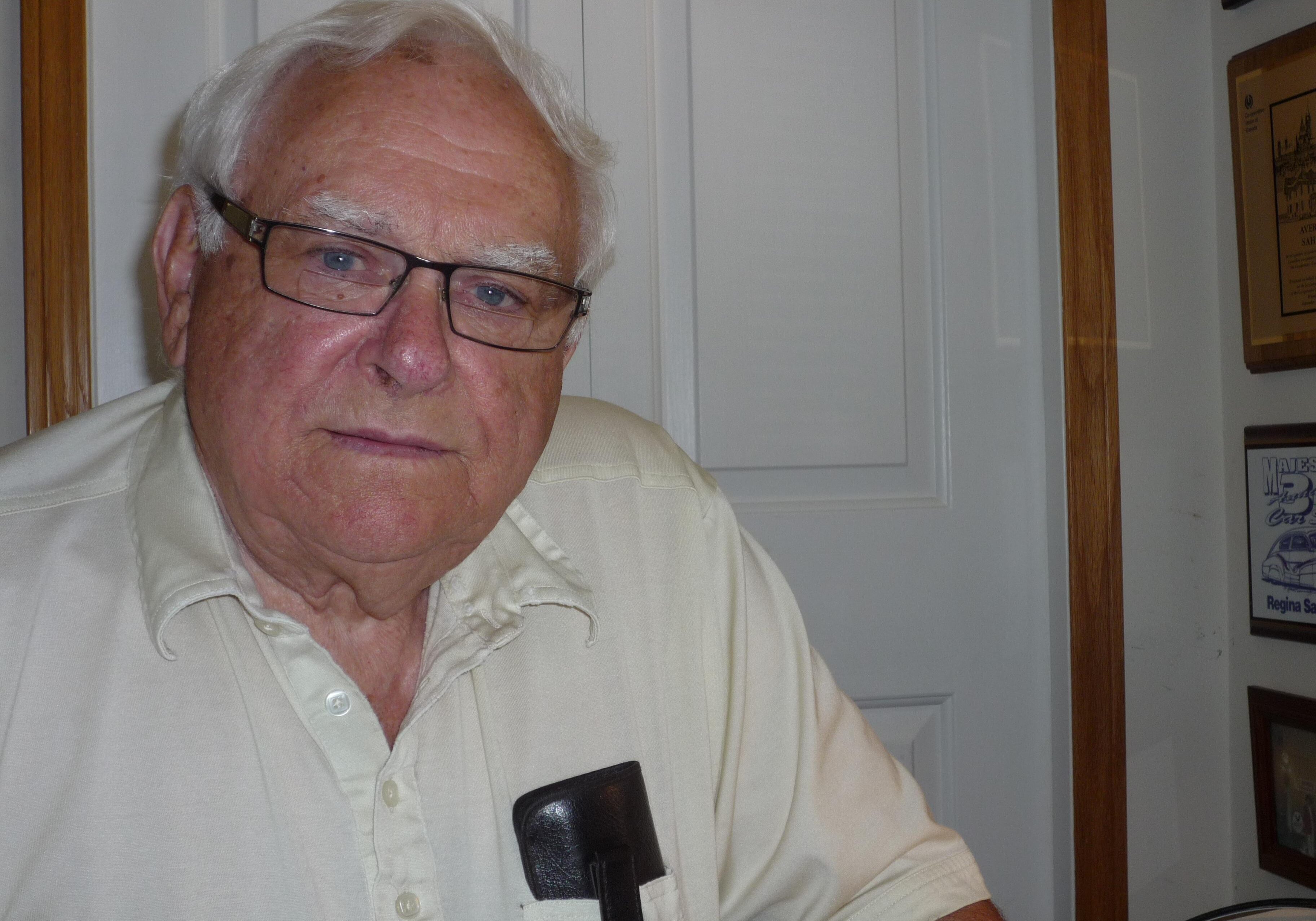
Avery Sahl
Farmer, Delegate, Member: Saskatchewan Wheat Pool, Canadian Grain Commission, Canadian Wheat Board
Avery Sahl has worked in many different roles in the grain trade, such as delegate of Saskatchewan Wheat Pool, farmer, and member of the CGC and CWB. He was born on a farm in 1926, where his father worked for a tractor company. He discusses what it was like to grow up in the depression era and the way things steadily improved. A major theme of his interview is the different stages the grain elevators took: new ones popped up over time and then shut down or amalgamated, all depending on the economy at the time. He is very aware of the many stages that grain goes through to get to the consumer. He has experience with inspection agencies and foreign markets, and he also worked as a farmer and in the elevators.
Snippet
Full Interview
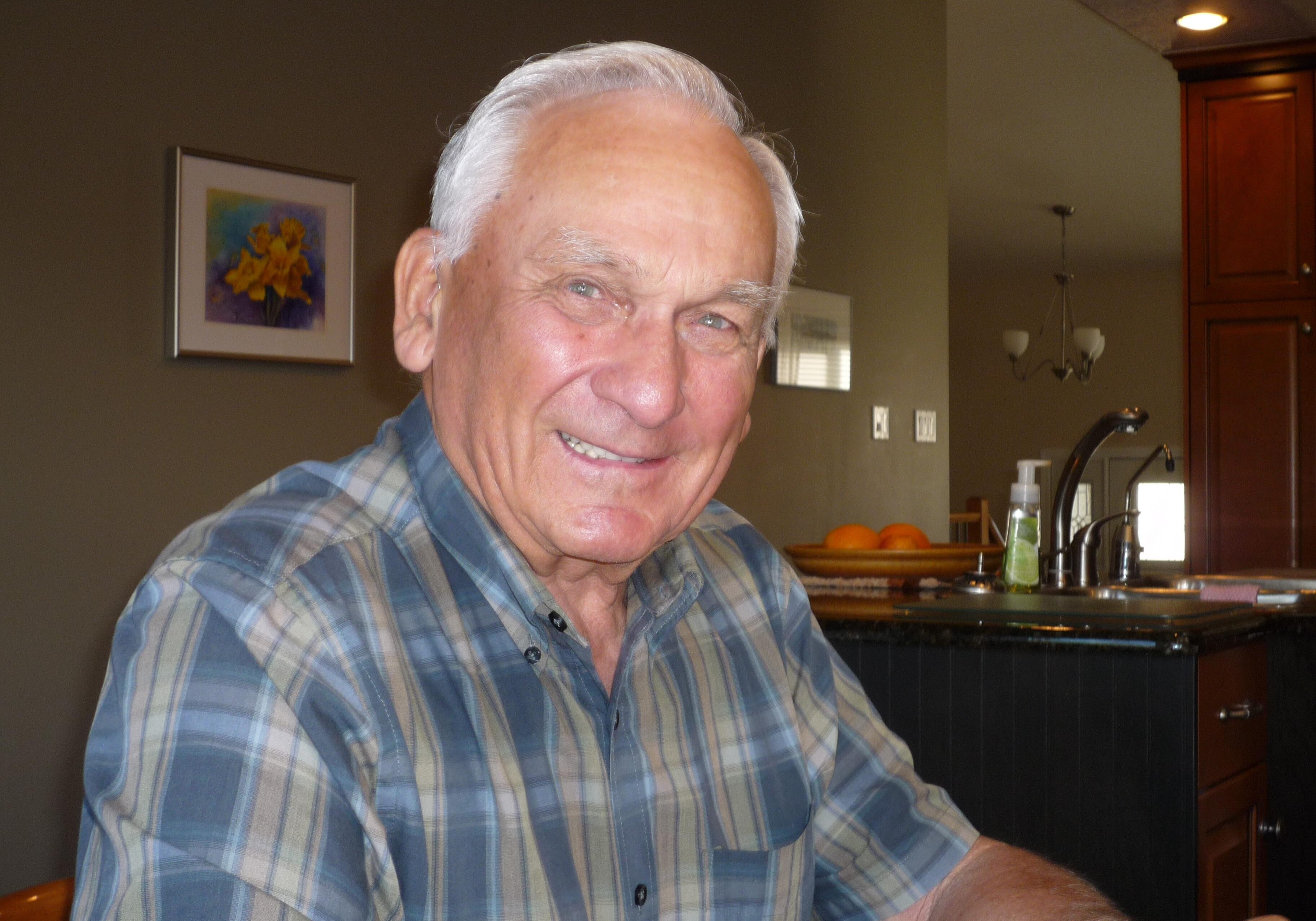
Ray Schmitt
Farmer, Delegate, President: Alberta Wheat Pool
Ray Schmitt has been a farmer since 1951 and still works as one today. He has also held a variety of positions at Alberta Wheat Pool, from delegate to president. He discusses the attitudes that farmers held towards to pools in his time, some being against them due to their size and supposed misrepresentation of them, while others supported them as the idea of a co-op appealed to them. Ray played a major role in representing farmers and speaks to the politics of grain elevators. He speaks to the changes in the grain trade, especially the amalgamation of many small elevators into a few larger ones, and also technological changes.
Snippet
Full Interview

Brent Scollie
Historian
As a historian, Brent Scollie's main area of interest is the early development of Thunder Bay's (Port Arthur & Fort William) grain industry, from the laying of the first railway tracks to the construction of the railway-owned grain elevators. Brent recounts the main players involved in the development of this period (1880s-1910s) and the various conflicts with local families, companies, and townships as the industry grew. Grain elevators also changed rapidly during this era, from the first elevator being made of wood to the first successful use of concrete slip-forming.
Snippet
Full Interview

George Searle
Elevator Operations Manager, Export Division Representative, Senior Manager: Searle Grain Company
George Searle, grandson of the founder of the Searle Grain Company, worked in the grain industry for most of his life. Despite his family connections, George started out at the bottom pushing paper as a document handler in Searle’s terminal division. Given his abilities and family connections, his career moved ahead quickly. He speaks of the time spent managing Searle elevator operations in New Westminster and Thunder Bay and travelling the world representing Searle’s export division. Eventually he became a senior manager. In this interview, George discusses the in-and-outs of his positions, emphasizing the importance of personal relationships at all levels. George also recounts how his family entered the business, how the grain industry changed over the years, and how, in spite of his love for the industry, he persuaded the family to sell its interest in it.
Snippet
Full Interview
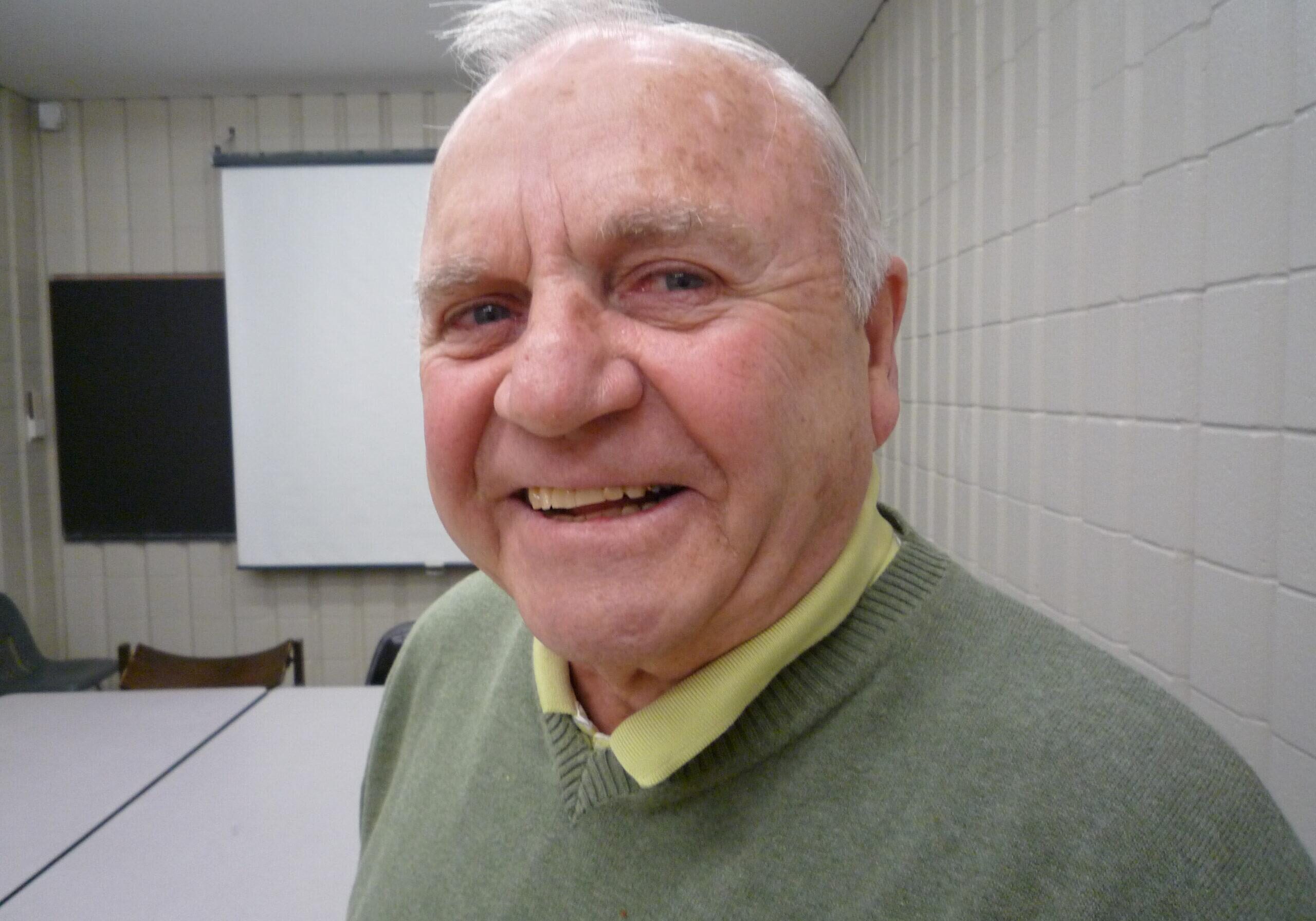
John Shaw
Owner: Shaw Bakery
Shaw Bakery has been a mainstay in Thunder Bay since the 1920s when John Shaw's father and uncles started the business. As a young boy, John wanted to be involved, and he was given the task of walking the bakery's horses up and down the back lane to keep them exercised. John remembers his father and uncles working through the Second World War, giving bread and what other scarce treats they could find to the local community. John continued his career in the family business, seeing it grow from local horse and wagon deliveries to trucks going across Northwestern Ontario, eventually ascending to president. John speaks to the challenges family-run businesses faced over the decades to stay competitive, especially as supermarket chains with in-store bakeries started to take over.
Snippet
Full Interview
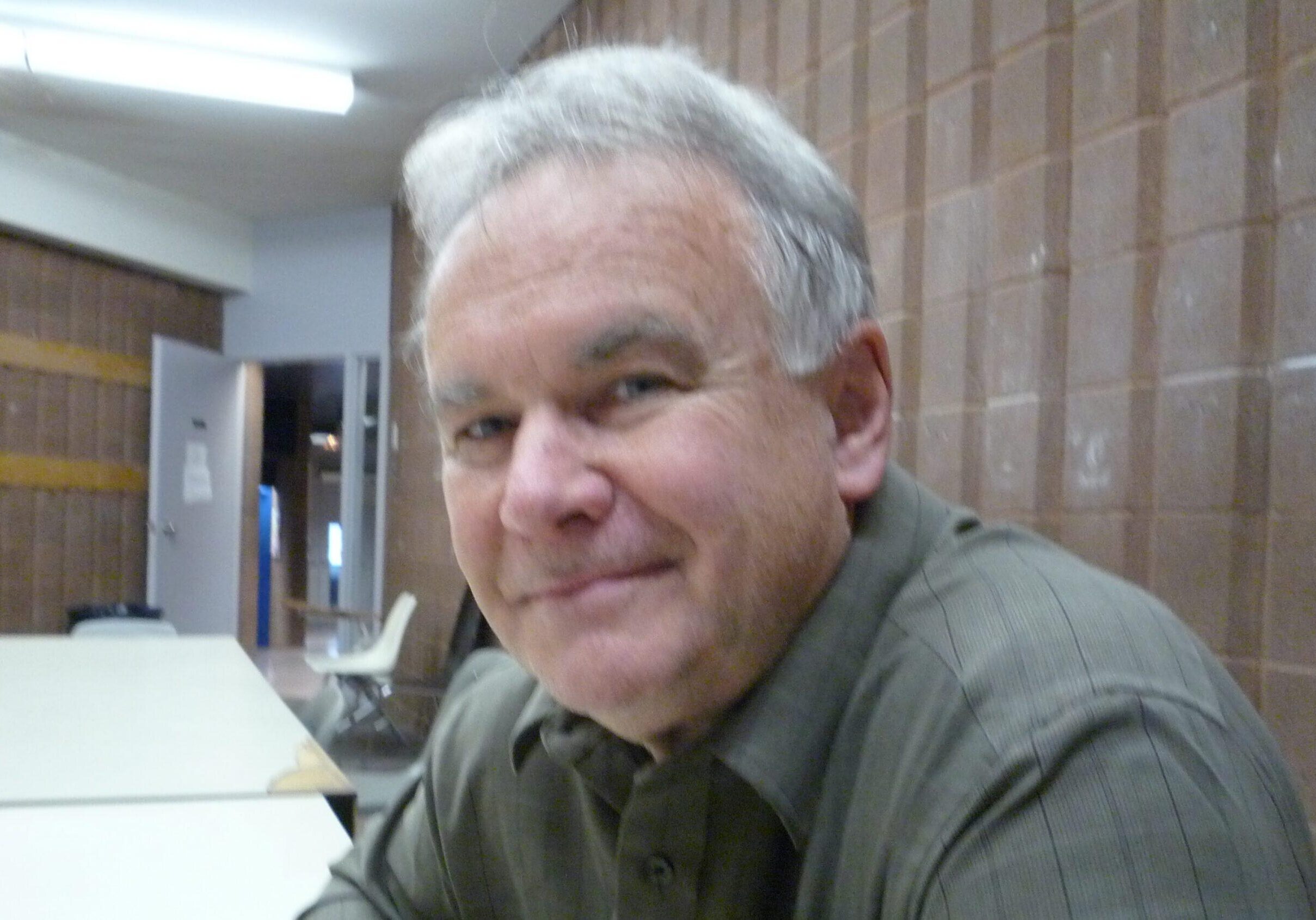
Steven Sidorski
Grain Inspector: Canadian Grain Commission
Steven Sidorski began his grain career as a summer student at Canada Malt's Thunder Bay elevator, where he learned about grain handling and the specialized malting process. Steven then moved into the Canadian Grain Commission's inspection branch, where he stayed for 35 years. Along with describing the inspection work done in the terminal elevators, Steven also explains all the other points in the national system where grain is inspected and what kinds of tests are run on samples. Over his 35 years with the organization, Steven witnessed the major computerization and automation of terminals and inspection equipment, the downsizing of the industry, and the increase of women in the CGC's ranks. Still working in the industry at the time of his interview, Steven comments on the contemporary issue of attempted deregulation of the CGC and it's mandatory programs. Steven also mentions his involvement with the CGC's union, the Public Service Alliance of Canada, of which he became the local president.
Snippet
Full Interview
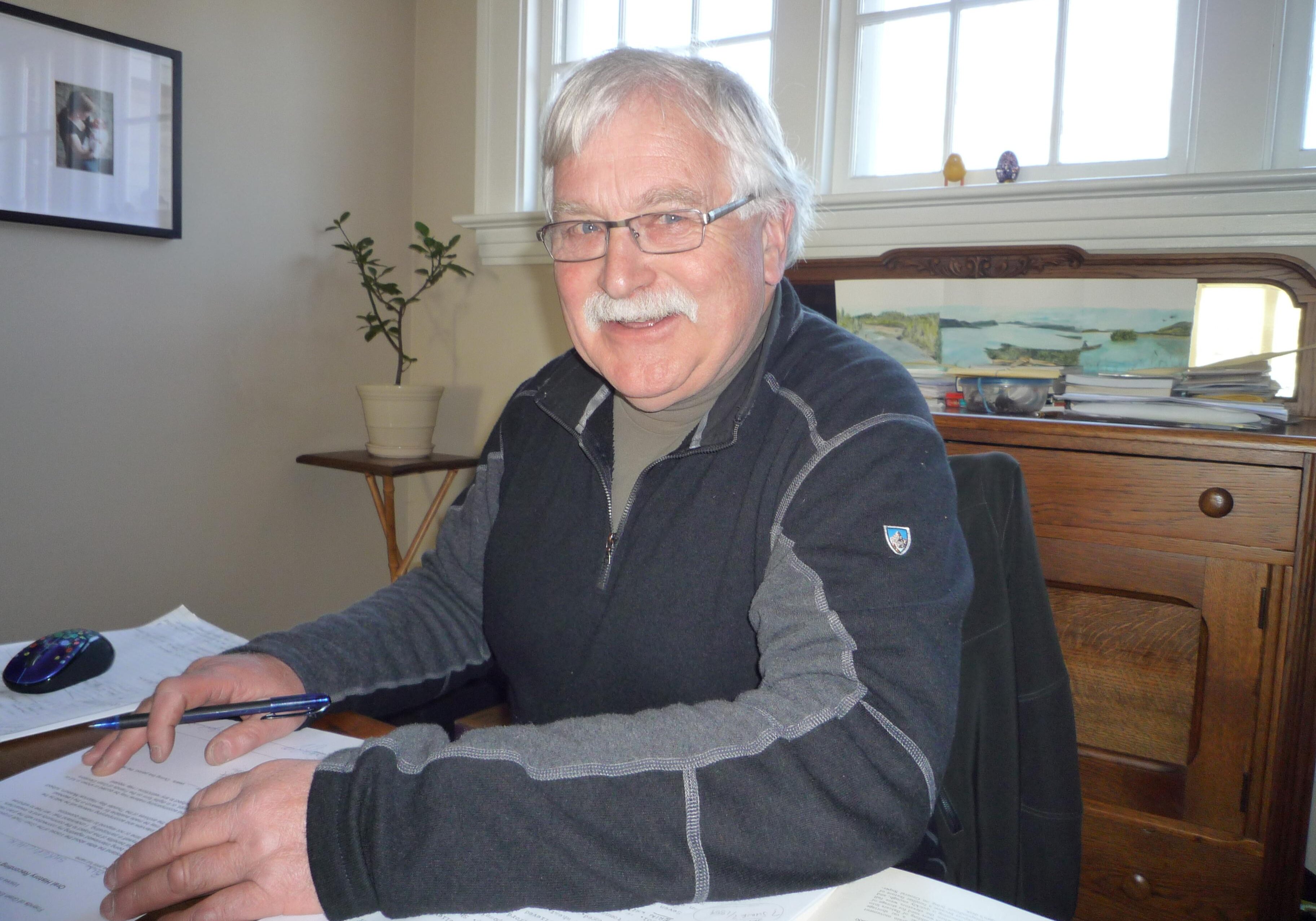
Bill Skrepichuk
Historian
Bill Skrepichuk is an amateur historian who studies the grain industry. His father was involved in the industry as he was initially a sheet metal worker and then an elevator employee. He comments on the first spike of the railroad - started in Fort William - which leads into a conversation about the advancement of the CPR. Another interesting topic he discusses is the implementation of telegram lines and how much it changed the industry. His interview focuses specifically on the late 1800s - a period which is not well-documented. He generally discusses the economics and politics behind the trade at the time as well.
In his second interview years later, Bill expands on his family's history and connection to the grain industry, like his father's work with the newly-opened Northland Machinery, owned by local business legend John Andrews. Bill also remembers his summers on his aunt's farm in Saskatchewan, which developed his deep appreciation for the grain industry in Thunder Bay.
Snippet
Full Interview
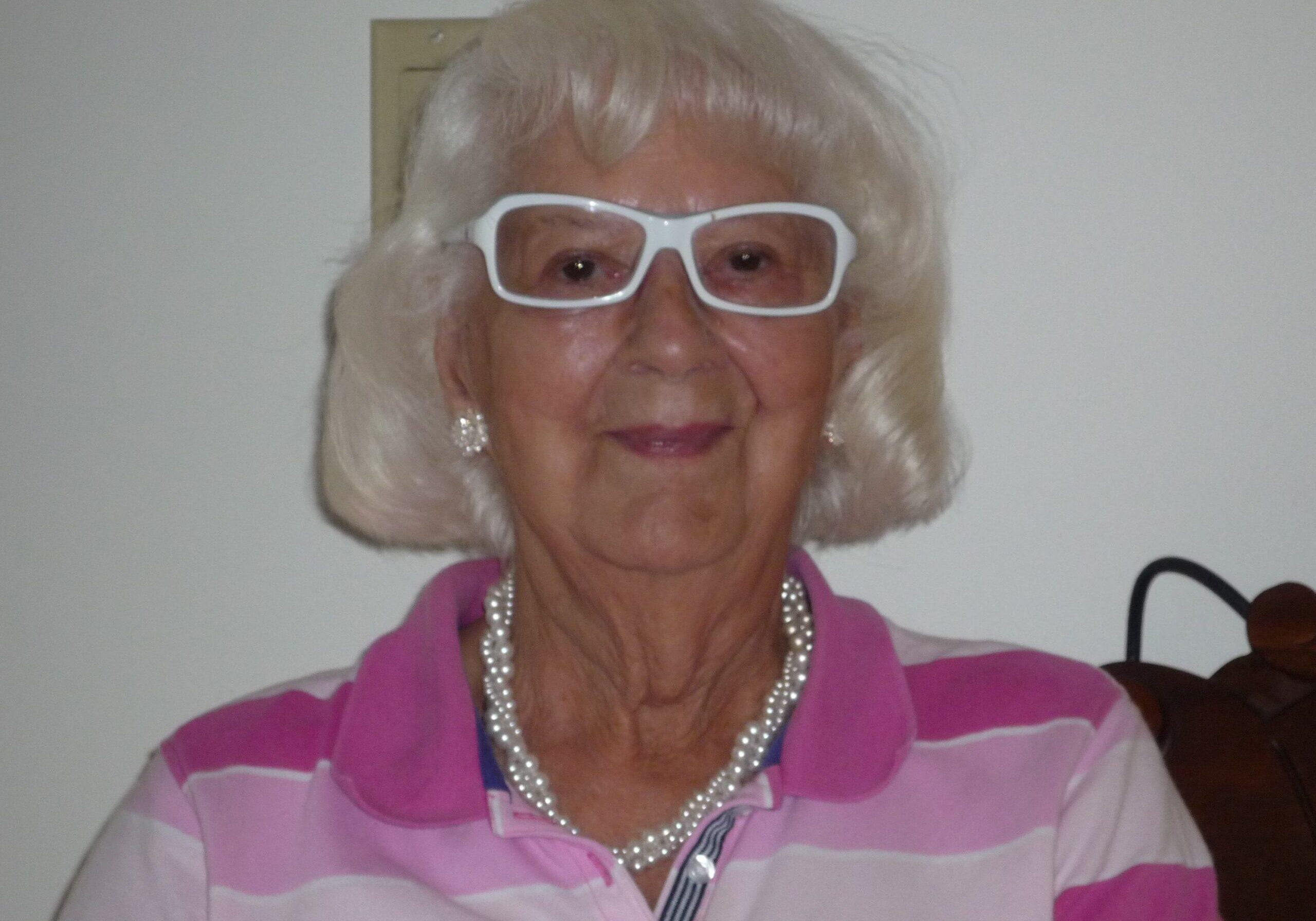
Carmel Smillie
Typist: Lake Shippers Clearance Association
In the late 1940s and early 1950s, Carmel Smillie worked as a typist for the Lake Shippers Clearance Association in the Fort William Chapple's Building. The typists - all young women - worked in the back of the office in a separate room typing out all of the ships' bills of lading and making perfect copies on the Gestetner. In the wintertime when lake navigation was closed, the typists worked on bills of lading for the occasional rail shipment of grain down east. Alongside the work, Carmel describes the social activities of the job in the typists' downtime, like visiting a grain ship to see it load or learning to knit and play Canasta.
Snippet
Full Interview

Donald Smith
Structural Engineer, Owner: Resource Engineering
Donald Smith's connection to Thunder Bay's grain industry began when he joined C. D. Howe company as a structural engineer. Don continued to be involved with grain elevator work when he moved to V. B. Cook Company, as well as when he started his own firm, Resource Engineering. Don lists some of the projects he did for these companies, including dust control upgrades, storage annex expansions, computerization, distributing system automation, and structural work for other non-grain industries. Don's elevator engineering work took him as far as Ghana, where he supervised the beginnings of construction for grain handling infrastructure, and to closer climes, where he assisted in automating the Bunge Elevator in Quebec City.
Snippet
Full Interview

Peter Spafford
Farmer
Peter Spafford grew up in Manitoba on a farm and worked in customer harvesting and construction for a long period of time. He talks about the hard life of a farmer, and his extreme commitment. For instance, at one point he was still working while he was on crutches, and he would often have to use old and ineffective machinery. Peter has experienced work in the industry for a very long time and speaks to the changes he saw due to technology, market shifts, and more. He explains why working in the industry was so hard and volatile as well. Lastly, he speaks to the connections he made with others here and the importance of the agricultural industry to Canada.
Snippet
Full Interview
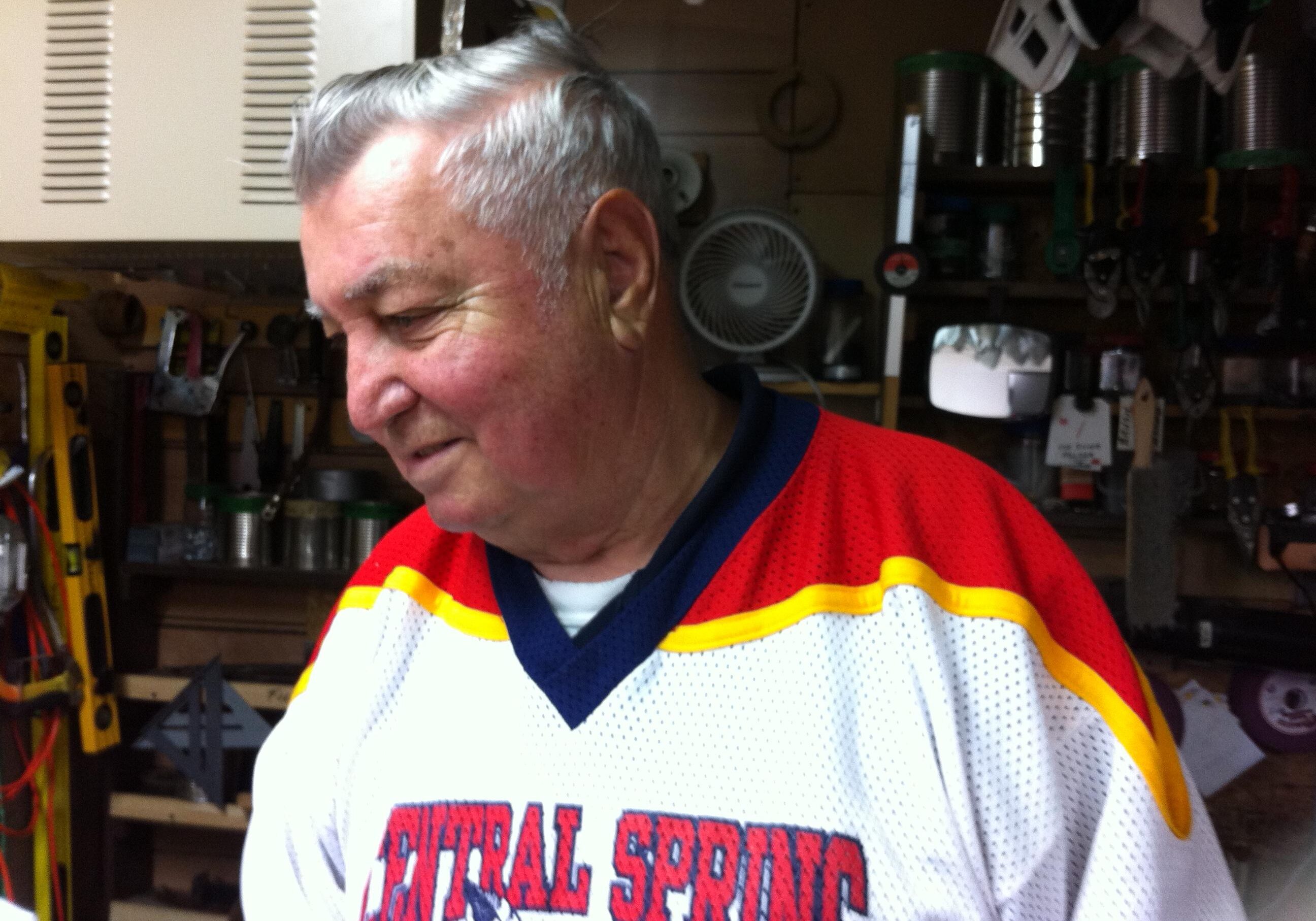
Bob Speak
Elevator Labourer: Saskatchewan Wheat Pool
Bob Speak was pushing wheelbarrows of cement for a construction company for $1.00 / hr, but he was offered a job at the elevator carrying a small bucket & scoop for $.99/hr. It didn't take much to figure out which was the better deal. After starting in 1951, he spent the next 39 years at various elevators. Bob had the misfortune of being involved in the 1952 explosion of the Saskatchewan Wheat Pool elevator in Current River. His descriptions put the listener right into the horror of the situation and his fortunate escape.
Content Warning: This interview contains graphic descriptions of workplace accidents.